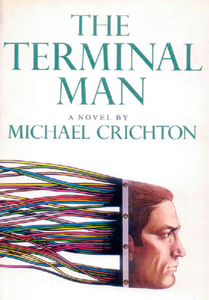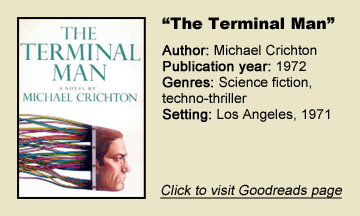His brand having been established with “The Andromeda Strain,” Michael Crichton shows it was no fluke with his sophomore effort under his own name, “The Terminal Man” (1972). It hasn’t aged as well as his debut, through little fault of the author’s (more on that later). Both novels tap into budding concerns of the age: bringing back a germ from space, and computers taking over people’s lives in a sinister fashion.
Fear of computers
In fact, the latter was the more immediate concern, as white-collar employees of the 1970s – such as those at the hospital in “The Terminal Man” – were starting to see rooms filled with a computer and associated equipment at their workplace. Questions followed, ranging from “Will the computer put me out of a job?” to “Will it control my mind?”
The title has two meanings. Harry Benson, who has a brain lesion from a car accident that causes seizures that lead to bursts of violence, is in a way like a dying patient. The doctors aim to stop his seizures in their tracks via an implanted mini-computer that delivers shocks.
But if that doesn’t work, he’s essentially “terminal” because the end game is that the authorities will have to shoot him. Benson is in an awkward middle ground where he’s not responsible enough for his violent acts to be locked up, but he’s not normal enough to be allowed freedom, because these seizures can kick in at any time.
A programmed brain?
The second meaning is that Benson is like a computer terminal. Before the onset of the world wide web and intranets, the idea of terminals was more prominent when people thought about computers. Benson’s body is like a terminal for his brain, which is being augmented by this implant. But unlike computer terminals, bodies are mobile, with legs and arms. Benson is worried that he’ll become a mind-controlled human, or put simply: a machine.
As with “Andromeda,” Crichton mixes the forward movement of the plot, a warning about unintended consequences of new technology, and philosophizing about the issues – namely mind control. In a provocative passage, the author notes that all humans are mind-controlled through teachings from their parents and schools.
Young children are essentially little computers being programmed, and their programming is mostly locked in by age 7. We generally understand this and are fine with it. But then when brains are augmented by a computer, people hypocritically fear mind-control.
Crichton comes up with another fascinating worry/prediction. Hospital bigwig McPherson (the POV alternates between him and surgeon Ellis, technologist Morris and psychiatrist Ross) envisions that by 1986, computers will run not on miniaturized components, but on artificially grown brain tissue.
We don’t know how brains work (and today, not much progress has been made), but that doesn’t mean we can’t use them. And the same holds for computers: Most of us don’t know how they work, but we can use them. Lincoln Child would later explore a similar angle in “Death Match”: Many coders don’t know the details of early computer coding, but that doesn’t mean they can’t build new code atop it.

Time capsule of outdated worries
I say “Andromeda” has aged better because that book’s concern is essentially the same as our current COVID-19 concerns. “The Terminal Man” taps into early fears of computers, but today, we generally don’t worry about computers taking over our minds.
Perhaps that’s because computers have already taken over our minds and we’ve found it to be not such a bad thing. Whether logical or eerie, the fact is that we aren’t scared of computers. So the book’s appeal is that it shows us what people were thinking in 1972.
Purely as a story, “The Terminal Man” is a weaker book. Crichton racks up quite a page count before anything happens outside of the procedure of Benson’s surgery. I learned plenty about brain surgery and the trial-and-error interfacing process that’s necessary when we don’t have access to precise maps of brain functions. But this is a fatalistic book whereas “Andromeda” is a mystery; a reader can see where this one is going.
Making up the difference, “The Terminal Man” features a wider range of personality types, and a more vibrant personality for each. I don’t know if Crichton was instructed to add a female character after the male-dominated “Andromeda,” but psychiatrist Janet Ross emerges as the primary POV character.
The author shows remarkable insight about women’s experiences, like when Ross is annoyed that a room full of men subtly change their behavior when she enters; she’d be fine with them behaving as they were. She’s not annoyed that she’s a woman, but she’s annoyed that she’s the only woman among her colleagues.
Overall, “The Terminal Man” now plays as a strong mid-history example of SF’s man/machine subgenre: newer than “Frankenstein” and “Rossum’s Universal Robots,” but dated compared to modern thinking about how humans and computers interact.
It’s in the fear-based era that encompasses PKD’s works (“Do Androids Dream of Electric Sheep” came out in 1968) and “The Terminator” (1984). But there’s something to be said for reading old stuff and remembering how we got here.


